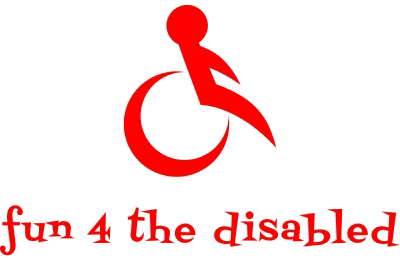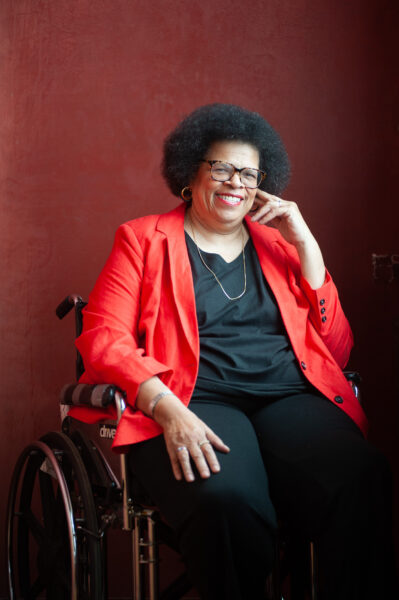Q&A with Vanessa Harris, Executive Director, Strategy for Access Foundation
The Project…
 ‘Disrupting Marginalization: Children’s Stories that Heal’
‘Disrupting Marginalization: Children’s Stories that Heal’
Location: Chicago, Illinois
The ‘Disrupting Marginalization: Children’s Stories that Heal’ is a Strategy for Access Foundation initiative that (in partnership with Tellin’ Tales Theatre) produces accessible video adaptations of children’s books that promote understanding of how children’s intersecting identities shape their learning.
The Organization…
Strategy for Access Foundation
Founded in 2019, the Strategy for Access Foundation, also knows as Fun 4 the Disabled, creates docu-series and other media about disability justice. Its mission is to “create an understanding that people with disabilities contribute to the global community in numerous ways” and are “assets to our society.”
Follow @fun4thedisabled: Website | Facebook | Instagram | YouTube
Follow @strategyforaccess: LinkedIn | #CrainsNotables 2022 Chicago Business Feature
The Q&A…
Q: How do you see the arts/culture/humanities as being essential?

Vanessa Harris: I think the arts are absolutely essential. I’m an engineer by training, and spent 30 years in engineering. But the arts help keep me relaxed, happy, healthy, and sane. The arts allow me to use my right brain. I like doing that. I met another engineer recently, an artist – who used to be a mechanical engineer, sort of meat and potatoes engineering. Now, doing art, brings out totally different aspects of her personality. Everybody has to have some experience with the arts, in order to help balance themselves out.
Q: What is the most important thing people should know about your work?
Vanessa Harris: We make videos for the disabled community. We believe that people with disabilities have just as much to offer if not more than able-bodied people. They should have just as much fun – if not more fun, and that’s why the Foundation also goes by the name Fun4theDisabled. The audience we reach is people with disabilities and their allies, so they can share good experiences with each other. We have everything – and encourage people to get involved in literacy, fun things to do, etc. We work with disabilities advocates; in fact we interviewed Judy Heumann a year ago. She was featured in the documentary “Crip Camp: A Disability Revolution,” and was instrumental in creating the ADA. She has a few books out. One, “Being Heumann,” her life story, is on the New York Times bestseller list. She worked for President Bill Clinton as well as President Barack Obama. The interview is on our website. It is called “Icon to Icon.” She called me an ‘icon’, and I said ‘Right!’
One of the first videos I did was about how to buy a car if you’re a wheelchair user. I did that – was very stressful. With making major purchases, you have to learn to do it right. I was learning while I was doing it. I learned a lot – how to get the right price, and the right equipment put into it. The salesman sold it to me, then did a switcheroo, and with a bigger price. I was already off the lot, and with the wrong car. He sent me somewhere to get the equipment put in, and they said you can’t use the wheelchair you have with this car. Will have to buy a wheelchair with us. I talked to my lawyer, who said stop the check. The dealer ended up giving me a new car, at a better price. He sent me to another place, to have it finished first, without paying for it. So then I made a film about it. I don’t want anyone to have to go through what I went through. It is one of our most popular.
We also did a series on children’s books. In many cases, we want to feature main characters with a disability. One was about Art Tatum. Another was on Jacob Riis. He was a photographer at the beginning of the 20th century, and did photos of New York tenements. He was able to get funding to help get the tenements cleaned up. He didn’t have a disability, but was fighting for social justice. So we did a video on a book, “Jacob Riis’ Camera” about his life. We also did a video about the life of Horace Pippin, who was injured in WW I. After his injury, he started engraving into wood pieces of art, and became well known as an artist. The book is called “A Splash of Red.”
Q: How did you arrive at doing what you do?
Vanessa Harris: I retired after a career in engineering, and was going to get my PhD, to teach engineering. I couldn’t walk anymore; I’m a wheelchair user. I was accepted into grad school, but then I got a bill from the university for $50,000, for tuition. I contacted my research advisor, and he said you have to find your own money. I contacted the National Science Foundation, and the guy I talked with said ‘you’re black, have a disability, have everything going for you to get funding. But think about it – when you’re trying to defend your thesis, what’ll happen to you.’ I thought about that. Went to my doctor. She said, ‘Go do something else for a while, think about something else.’ So I took a documentary class. I did a documentary on inclusive art. That’s why I say that art keeps me happy, and sane. I talked to the artist, and she said you’re really good. You should do more. And that was 80 videos ago now!
Q: Who makes your work possible?
Vanessa Harris: We list all of our funders on our website. We couldn’t get this done without them. And the volunteers, they help a lot. And then there are the people who watch the videos. The audience members are kids from age 3 up to age 8 or 9. We also find that in many cases, their grandparents also watch the videos with them, too.
You should know that Illinois Humanities was our first funder. About three and a half years ago, we were in a meeting with our team of volunteers. You called to say that the grant was approved. That was our first. We were all so excited. That played a big part in how we got to where we are today.
Suggested Reading by Vanessa Harris:
- Being Heumann: An Unrepentant Memoir of a Disability Rights Activist by Judith Heumann with Kristen Joiner
- Children’s books from our website: fun4thedisabled.com/category/storytime/
About The Illinois Humanities Grantee Partner Spotlight
Illinois Humanities highlights the work of our Community Grants program partners through our “Grantee Spotlight.” It shines the light on our grantee partner’s work, offering details about the organization and the funded project, as well as a Q&A with a team member at the organization. More: ILHumanities.org/Spotlight
About Illinois Humanities
Illinois Humanities, the Illinois affiliate of the National Endowment for the Humanities, is a statewide nonprofit organization that activates the humanities through free public programs, grants, and educational opportunities that foster reflection, spark conversation, build community and strengthen civic engagement. We provide free, high-quality humanities experiences throughout Illinois, particularly for communities of color, individuals living on low incomes, counties and towns in rural areas, small arts and cultural organizations, and communities highly impacted by mass incarceration. Founded in 1974, Illinois Humanities is supported by state, federal, and private funds.
Learn more at ilhumanities.org and on Facebook, Twitter, Instagram, and LinkedIn @ILHumanities.